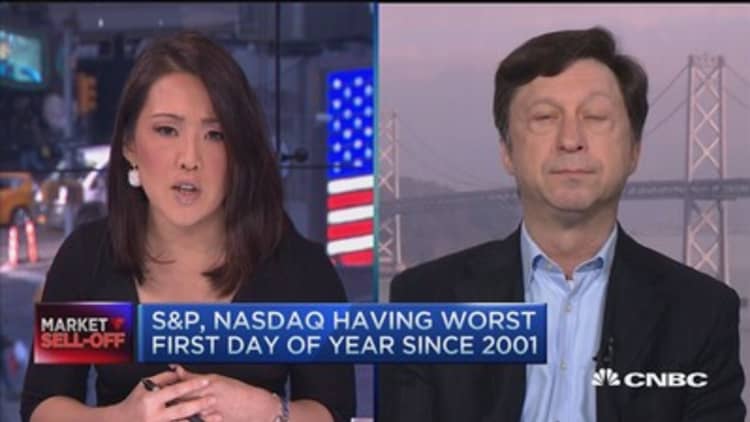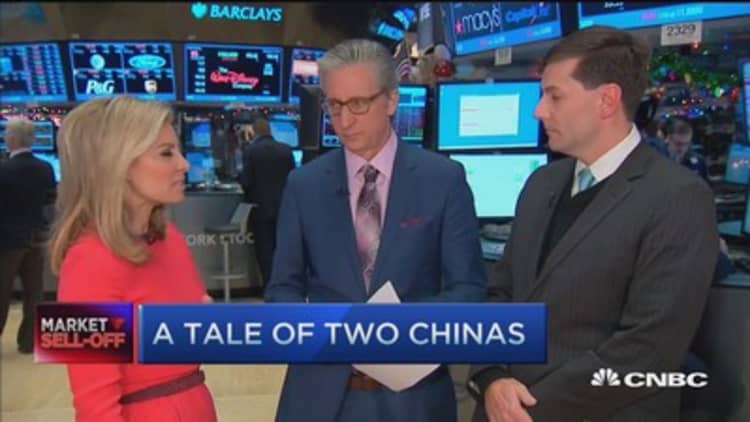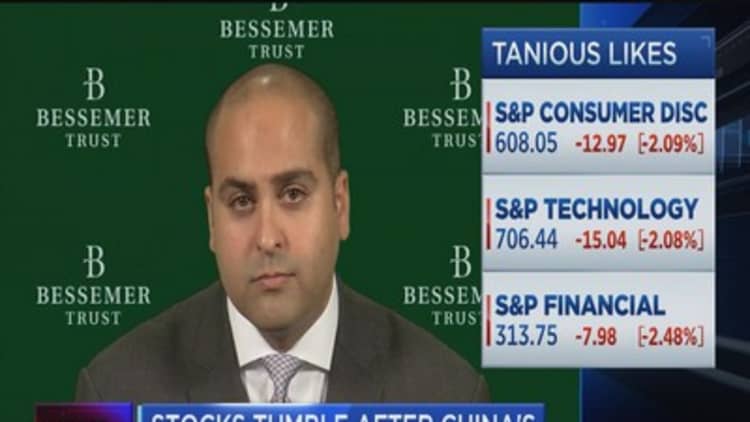


U.S. stock markets entered recovery mode Monday afternoon after a steep morning sell-off both at home and in the Asian trading session.
Major indexes closed down more than 1.5 percent, but briefly traded about 3 percent lower after the Shanghai composite saw a 7 percent plunge Monday. Part of the dip occurred as a key economic indicator, Caixin manufacturing PMI, reported soft results.
But experts told CNBC's "Power Lunch" that there's more to Monday trading session than just the Chinese manufacturing sector.
"The main point I want to make today is that the sharp fall in the Shanghai composite index really doesn't reflect a sharp change in the Chinese economy," said Andy Rothman, China investment strategist at Matthews Asia.
Rothman and other pros listed factors affecting stocks that have little to do with Monday's PMI reading, including Chinese consumers, U.S. manufacturing data and earnings growth.
Read More Fears of a Chinese hard landing 'vastly overblown': Expert
1. Chinese consumers
Rothman said the Shanghai composite overweighs state-owned enterprises and construction companies, obscuring job and wealth creation in the private sector.
"The biggest part of the economy in China now is the services and consumption part," Rothman said. "And that part of the economy is doing really, really well."
Indeed, Monday's rout could be viewed as "the tale of two Chinas," said Brendan Ahern, chief investment officer at KraneFunds, which specializes in ETFs and investment opportunities for the next wave of China's development.
"China's domestic consumption is the most unheralded growth story in capital markets globally," Ahern said. "China's retail sales have grown at an over 10 percent rate over eight months in a row. So we think investors have been very much overweight the part of China that's slowing: the export-driven manufacturing and industrial sector."
Ahern favors domestic e-commerce brands as a play on what he sees as the early innings for the burgeoning consumer sector.
"Part of China's doing really well," Ahern said. "You just have to know what part of China to own."
Read More The easy way to bet on a Chinese stock market disaster
2. U.S. manufacturing data
China wasn't the only economy to see weak manufacturing numbers.
The U.S. economy's manufacturing sector contracted further in December, according to an industry report released on Monday. The Institute for Supply Management (ISM) said its index of national factory activity fell to 48.2 from 48.6 the month before, missing the 49 expected by economists.
U.S. oil prices also pared earlier gains during Monday's trading session, settling 28 cents lower, or 0.76 percent at $36.76 a barrel.
"There's oil, there's manufacturing numbers here in the U.S.," said Matthew Cheslock, equity trader at Virtu Financial. "But we're going to start with China; that's the first thing we're going to look at tomorrow morning. I'm not going to do my whole year based on today's move."
Read More Dow closes down triple digits, posts worst opening day in 8 years
3. Earnings growth
Though volatility in Asia haunted U.S. stock markets Monday, it's domestic earnings growth, not foreign economies, that will set the tone for 2016 trading, experts told CNBC's "Power Lunch" Monday.
"As we approach the seventh anniversary of the bottom of the market, March of 2009, earnings have begun to wane thin, valuations are pretty lofty, and that's a headwind," said Scott Clemons, managing director of private wealth management at Brown Brothers Harriman. "That's an obstacle for markets in 2016. Whether or not we get earnings growth in 2016 — that's the real fuel, that's one of the dynamics I'm watching very carefully."
Joseph Tanious, principal and investment strategist Bessemer Trust, compared to the market this time last year — when the dollar was strengthening and further oil price declines loomed. He told CNBC the factors that dragged down markets last year are unlikely to repeat themselves.
"I think part of what really weighed down earnings growth in 2015 was what happened with oil prices," Tanious said. "But as we know, heading into the first few months of this year, that should begin to fade. I think you are going to see a modest acceleration in earnings growth."
Read More Trade it: What first day plunge means for 2016
— CNBC's Bob Pisani and Reuters contributed to this report.


